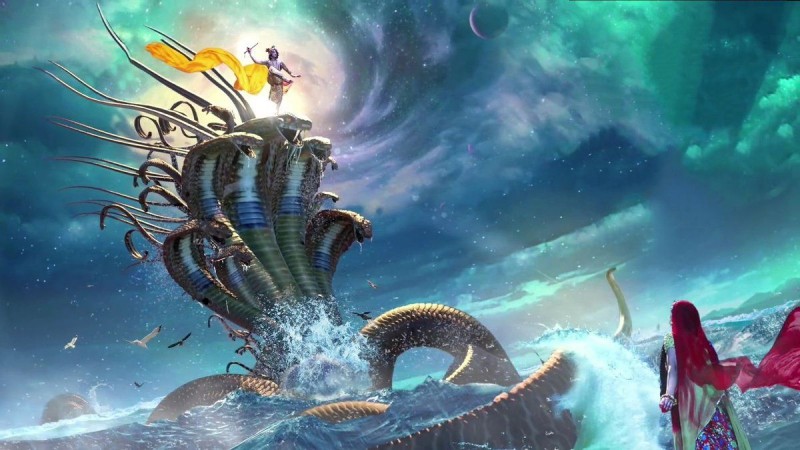
In the vast and colorful tapestry of Hindu mythology, Sheeshnag, also known as Ananta Shesha or Adishesha, holds a significant place as a divine serpent of immense power and eternal existence. Often depicted as a multi-headed serpent, Sheeshnag plays a crucial role in supporting the cosmos and serving as a symbol of timelessness and infinite endurance.
In Hindu mythology, the stories of Sheeshnag are intertwined with the creation and preservation of the universe. According to some versions, Sheeshnag is said to have emerged during the process of creation, coiling around Lord Vishnu, the preserver of the universe, as he rested upon the cosmic ocean. The serpent's coiled form serves as the cosmic bed (Shesha-shayana) for Lord Vishnu, symbolizing the sustenance and support of the cosmos. Sheeshnag is often depicted as a massive serpent with numerous heads, each one capable of spitting fire. The number of heads can vary in different depictions, ranging from five to a thousand, representing infinite possibilities and universes. He is usually portrayed as having a thousand hoods, symbolizing his vastness and ability to extend across the universe. The coiled position of Sheeshnag represents the cyclical nature of time and the constant process of creation, preservation, and destruction that governs the universe. As the serpent supports Lord Vishnu, it represents the cosmic force that maintains balance and order, upholding the world and preventing it from descending into chaos.
Sheeshnag is not merely a physical entity but a divine being with profound cosmic significance. In addition to supporting Lord Vishnu, he is associated with several important mythological events:
Churning of the Ocean (Samudra Manthan): In one of the most famous tales from Hindu mythology, the Devas (celestial beings) and Asuras (demons) came together to churn the cosmic ocean to obtain the nectar of immortality (amrita). Sheeshnag played a crucial role in this process, acting as the pivot around which Mount Mandara was placed and providing the support needed to churn the ocean.
Birth of the Universe: Sheeshnag's presence during the process of creation is significant as he represents the eternal substratum on which the universe rests. His coils symbolize the continuous cycle of creation, sustenance, and dissolution, reflecting the cyclical nature of time and existence.
Tales in Puranas: Sheeshnag is also mentioned in various Puranic texts, where his role as the bed of Lord Vishnu and the supporter of the universe is emphasized. These texts further explore his interactions with other deities and beings in the cosmic order.
The symbolism of Sheeshnag extends beyond mythology and holds philosophical and spiritual significance. He embodies the concept of timelessness and the infinite, representing the eternal nature of existence and the cyclical pattern of life and death. Sheeshnag's presence as the cosmic serpent beneath Lord Vishnu illustrates the interconnectedness of all things in the universe and the underlying unity that binds creation. Moreover, Sheeshnag serves as a reminder of the importance of balance and support in the cosmic order. Just as the serpent provides the foundational support for Lord Vishnu, harmony and cooperation are vital for maintaining balance in the universe and the wellbeing of all living beings.
In conclusion, Sheeshnag, the divine serpent of Hindu mythology, is a symbol of timelessness, infinite endurance, and cosmic support. His presence as the bed of Lord Vishnu and his role in supporting the universe signify the cyclical nature of creation and the interconnectedness of all things in the cosmos. Sheeshnag's symbolism continues to inspire philosophical contemplation and spiritual reflection, inviting us to recognize the eternal and harmonious aspects of existence.
Also read -Kailash Mansarovar: A Historic, Cultural, and Religious Gem Lost in Indo-China War